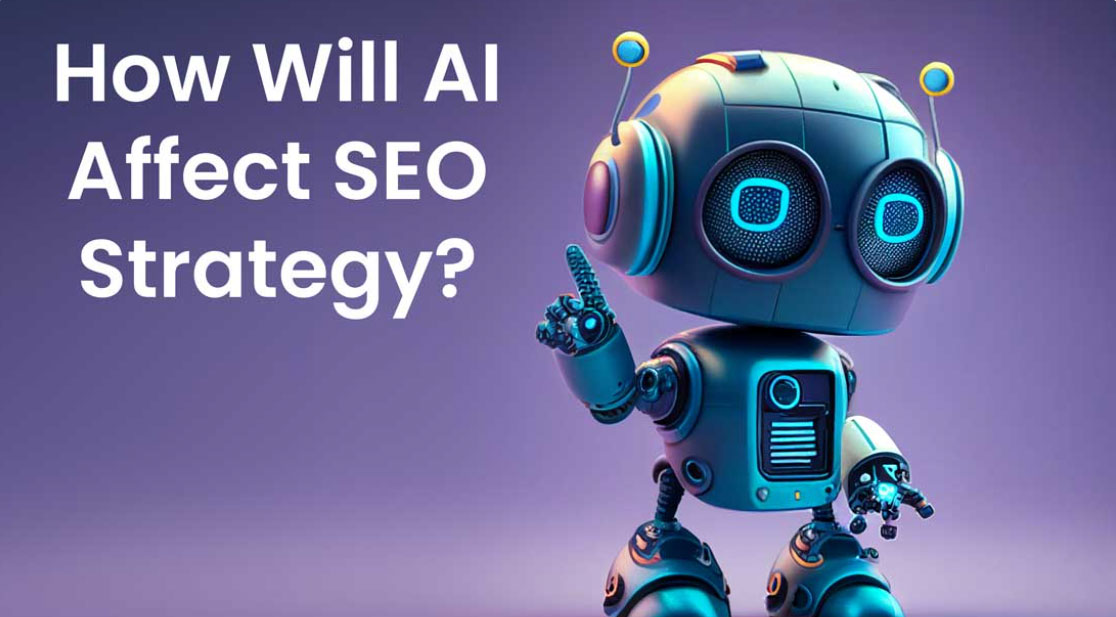How Is AI Going to Affect SEO Strategy in 2025 and Beyond?
How Is AI Going to Affect SEO Strategy in 2025 and Beyond?
Posted on: October 17, 2024 | Written by: Scott Kasun

The Artificial Intelligence Revolution
Here at ForeFront, we get a lot of questions about AI and – more to the point – how AI is going to affect the future of search. There’s a tremendous amount of misinformation out there about these topics, and not necessarily because of folks trying to mislead or sensationalize (though there is a good bit of that, too). The fact is that now that AI has caught fire, the advancements will be rapid, and it can be very difficult to predict just what the future will hold. I’ll make my predictions based on what’s already being implemented and what appears to be just around the corner, as it’s enough to keep us all busy for some time.
We’re All Experienced AI Users – At Least When it Comes to Google
It may surprise some readers to know that we’re already using AI when we use Google, and this was happening long before the Google AI overviews started appearing at the top of the search results. As Google itself will tell you, the company has been dabbling in artificial intelligence since 2001, using machine learning to suggest better spelling for web searches. And they haven’t stopped, with innovations like Google Translate, Transformer (neural network architecture) and 2023’s Bard, which is integrated into Gmail, Docs, YouTube and many other Google platforms. And clearly, Google’s Search Generative Experience (SGE) is the model for the future, like it or not.
Long story short, if you use any Google services, you’re already using AI. See, you’re cutting-edge and didn’t even know it!
The Coming Advances Will be Slow – Until They Aren’t
Google has already tipped its collective hand regarding one of the biggest catalysts for big upcoming changes with the aforementioned Google AI Overviews.
AI overviews are already here
As of this writing, AI overviews don’t show up for every query, but I do see them more often than not, especially for longer, more specific prompts. Some searches, such as the “How will AI affect the future” search in the graphic, are quite hard to summarize and will likely lead the user to click into other articles for more detail. Others, such as “How old is George Clooney” or “What is tzatziki” may be fully answered right away, in which case the user has what they need and simply closes the search or clicks away. This results in a phase you may be familiar with: zero-click searches.
A zero-click search may sound fairly negative, but it’s actually a win for the user. They found what they were searching for without having to comb through an article or a long blog post in search of a single detail. No, it doesn’t help anyone’s products, services or content marketing, but let’s face it: Most informational searches aren’t about conversions to begin with.
In the big picture, however, you can start to see how these results have potential to turn the tide. If we go back to the tzatziki search, it’s entirely possible that search engines could include a link to a recipe website or even an actual product for purchase. One would assume that the selection of those links would be procured via the traditional algorithm, but now there’s only room for one or two links, as opposed to the 10 that show on a normal organic search results page. No. 1 has always garnered the lion’s share of clicks (27.6% of them, to be precise); with AI, it’s entirely possible to be the only link offered.
The takeaway? Well, folks, the fight for top placement isn’t ending anytime soon, but it could get more ferocious. Happily, though, things get a bit easier when we factor in normal human behavior.
Human Distrust to the Rescue

If you actually were looking for a recipe to make your own tzatziki, how likely are you to pick the first one and start mixing ingredients? I dabble in cooking when the mood strikes, and I’m no stranger to searching for just the right recipe. I probably average 3-4 peeks at various recipes, and I don’t know that I’ve ever stopped with the first one, unless it’s something idiotically simple.
So we can take a bit of solace, knowing that most people will want more than one AI-suggested link, and will likely go a bit deeper with their search. There’s still a chance for first page search results. At least until…
We Are All Being Groomed to Be Good Little Human/AI Partners
Remember the good ol’ days of the internet, when a search such as “car repair” would get you what you needed? Well, we’ve all learned how to do “long tail” searches, and now that phrase would be more like, “brake pads and rotor service for 2022 Honda Pilot in Columbus Ohio.” The common mentality is that a little more typing up front equals a lot less searching around for just what we want.
Well, it’s going to get even more descriptive, so get your typing fingers ready. Using an AI model, you can query it like this:
“Create a spreadsheet of car repair shops within 5 miles of my house that work on 2022 Honda Pilots and can replace my brake pads and rotors. Be sure to include how long they have been in business, whether they are Better Business Bureau accredited, what their average Google review score is and any estimated prices for their services.”
And this is just a quick sample; I’m sure car nuts can come up with a dozen more factors to include. Either way, we’re all going to become “AI prompting experts” – at least until AI can read our thoughts (not likely, but leave it to Elon) or simply knows the criteria that should be considered when searching for brake jobs (much more likely).
So … It Sounds Like There Won’t Be Any More SEO?
Well, some things (such as content marketing and backlinking) will be status quo, but other tactics will require adaptation. And a lot of it depends on what type of SEO you’ve been practicing or relying on.
Keep in mind that AI models will still need to “rate” websites. Sure, some hyperlocal searches are simply proximity-based (“dentists near me”), but that factor exists today. More generic searches, or searches that cover a wide area, will need much more than location to be included for consideration. So many of the traditional “signals” – backlink profile, site speed, domain authority, etc. – won’t lose their importance anytime soon. But there is a key issue, and it’s one that most SEO agencies aren’t equipped to deal with.
There Are Obvious Signs That Google Saw This Coming

I can’t remember how long ago it was when Google emphasized that site content was a huge signal (“content is king;” damn, that’s a tired phrase), but I know it’s been quite a while. We hired our first content writer because we could clearly see that quality content was boosting site rankings. And over the years, Google’s semantic modeling layer just continued to improve, to the point that it’s almost human-like in its ability to understand the context behind content.
So for years, our company and like-minded agencies have spent a lot of time and energy creating robust websites, full of well-written content and juicy fodder for the Google bots to consume. Content that is easily parsed, understood and considered, by humans and language models alike, just as Google urged us to do. It’s almost as if … they were planning for this moment?
The New World Will Leave a Lot of “Agencies” Behind
I made a dig about most agencies not being prepared earlier. Here’s what I mean by that.
In our business, paid ads (in particular, Google Ads) are the most visible product. Everyone knows what they are, everyone claims not to click on them, but enough people do that Google is worth billions and everyone we talk to wants to run ads. Some dirty agency secrets:
- It’s easy to run ads. Google has invested millions – possibly billions – into creating a platform where people without paid ads knowledge can create ads.
- It’s easy to get Google certified. It’s harder than it used to be, but you can get that Google certification in a very short time.
- It’s easy to get lots of traffic to a website – especially if you don’t care whether they convert and are just looking to inflate numbers to make the previous agency look like they didn’t know what they were doing.
- There is NO barrier to entry in this business. A person can create a simple campaign for a high school project and then claim to be a Google Ads expert.
The point here is that Google Ads are the way most “agencies” start. And over time, some of them get better, actually figure things out and realize that, while it’s easy to do ads, doing them well is a whole other story. The truth is, running Google Ads does NOT make you an SEO agency. Not without a whole bunch of other disciplines and expertise in a number of other areas.
Google Ads are, for the most part, what is referred to as “top of the funnel” marketing. You run ads to catch attention, get users to click and, voila, you’re driving traffic to the site. Pure organic SEO falls into the same category. You optimize a site for a slew of phrases, a user searches on one of those phrases and, boom, a site visitor. Now it’s up to the site to shepherd that user to the promised land.
And this is where a breakdown often occurs. This is the “middle of the funnel,” where the user is gathering the data they need to (hopefully) make a buying decision. Whether the user arrived there via a Google Ad or organic search, a competent agency will have led them to a carefully optimized page, designed to get them to perform a pre-determined action (buy this, download that, sign up for something).
At least, that’s what is supposed to happen. Most ads simply take the user to the home page, forcing them to search for whatever captured their interest in the first place. A measurable percentage won’t bother to look or won’t find it, and that leads to a wasted click and wasted money. It’s the lazy way of running ads, but it’s indicative of the way most websites are built. It’s all about getting traffic to the site, then putting all your faith in the belief that visitors will find what they’re looking for.
The middle of the funnel has largely been ignored, but it’s about to be the most critical piece of the puzzle. Simply put, if you don’t know how to create a proper customer journey – or even what that is – the future of your site(s) will be bleak.
Stuck in the Middle With You

Take a step back for a moment, and take a look at a typical search process here in 2024. Let’s say you and your family are headed to Hilton Head Island for vacation, and you want to rent some paddleboards to use while you are there. That process would likely go something like this:
- Google a phrase such as “paddleboard rentals in Hilton Head”
- Scan the search results to make sure you’re seeing what you expected
- Click on a result (27% chance it’s the first result)
- Work your way through the site to find the criteria you want (price, reviews, hours of operation, etc.)
- Go back to your original search and do it again with another site
- Repeat the process to your heart’s delight
We LOVE this model, so thank you to everyone who follows these steps. It gives the sites we support a high probability of getting a click, and once a user is on a site we’ve made, our conversion probability is high. I’m not boasting here (well, maybe a little), but we have amazing people who are incredible at what they do, from our designers to copy writers and so on. They make websites that are immersive, easy to use and convert well. So if we can just get people to them, the odds are high that good things will happen. It’s that middle of the funnel, and we’ve been relentlessly dedicated to it for years.
However, this current search model is likely to change. Let’s take a look at the future of search, and tweaking the Honda Pilot prompt example we used before, a possible search would look like this:
“Create a list of the top 5 kayak and paddleboard rental companies in Hilton Head, SC. Make sure to include all costs, their time in business, their average Google review score, their hours of operation, if they have a delivery service and whether we can reserve them online.”
At first glance, you might be thinking that there’s not much difference here; you still wind up with a list of websites that you have to visit to actually do anything. But the key here is that you’ve already pre-qualified the list.

With today’s traditional search, you’ve only filtered a search down to companies that rent paddleboards in Hilton Head (hopefully). You have to manually search each site to discover the rest of your requirements. And along the way, each site gets an opportunity to reel you in – or repel you.
Think about how fundamentally different your site visits would be if you already knew that the company meets the criteria you’ve established. You’re no longer visiting that site to read reviews, find their hours or anything. What would your criteria be at this point? Typical items would include:
- Does this look like a reputable company?
- Does the site look professional? Am I impressed?
- Is the site slow?
- Is the site easy to use?
- Can I easily find where to book?
- Is the content useful?
- Does the imagery make me more comfortable with their services or product offerings?
- Are there any credibility builders, such as travel site awards?
From a site perspective, you get far fewer opportunities to “wow” the visitor, and a lot of their decision process is superficial – at first.
Why Don’t You Meet Me in the Middle
There’s no doubt that a slow, shoddy website is a turnoff; those facts would apply in either scenario. But given that an AI search can give users all the info they need before they ever view the site, AI puts all our skills as website creators to task.
- The design has to impress, draw visitors in and be evocative enough to create some sort of user action
- UI/UX has to be spot on
- The site speed has to be fast enough that visitors don’t get bored
- The copy has to be engaging and succinct, yet informative – and still has to be optimized to attract Google
- Content has to answer the likely questions that people will list as criteria in their prompts
- The navigation has to be intuitive
- The customer journey has to be purposeful and fulfilling
- Subliminal cues and effects have to be well-planned and executed
- Conversion has to be as simple as it can possibly be
Get any one of these wrong and you’ve whiffed on an opportunity. And since the visitor is already armed with what they need, there isn’t any point in them wasting time with a site that doesn’t impress; they will simply move on to the next item on their pre-qualified list. THIS is what it means to optimize a site for maximum “middle of the funnel” performance, and it will be the key to successful website conversion in the future. Get it right, and your visitors will be on their way to the “bottom of the funnel” and well-earned conversions.
Home Sweet Home
To anyone that has been in this business as long as we have, it feels very comfortably full circle. As zero-clicks continue to rise and users find alternate ways to wind up on your site, it’s time for good old fashioned marketing, with compelling content and believable credibility. Rand Fishkin, a long-time SEO sage and founder of one of our favorite platforms, Sparktoro, has a great take on this very topic and a stern warning that, “Marketing is Going Back to the 20th Century.” Check out what he has to say, and spend some time getting to know Sparktoro, because it’s exactly the type of thing that marketers will need in order to flourish in this new old world.
SEO is Dead; Long Live SEO
To be sure, rumors that AI is going to kill SEO are greatly exaggerated, at least for now. At some point in the future, your AI bot will know you well enough to make some of the buying decisions for you, and then we’ll face a different challenge. But for the foreseeable future, rest assured that Google is actually steering us in the right direction by continuing its emphasis on quality content and fast websites that actually help people – and that will never go out of style.
About the author:
Scott has over 30 years in Marketing and is Google Ads and Analytics certified. Scott started ForeFront Web back in 2001 – we can’t thank him enough for taking that leap and being the best boss to the company. He specializes in strategy, design and UI/UX. He still likes to dabble in programming, so our developers have locked him out of more websites than we can count. Scott enjoys scuba diving, watching his kids play sports, traveling and woodworking. He was also once an alternate contestant for American Gladiators (so close!).
